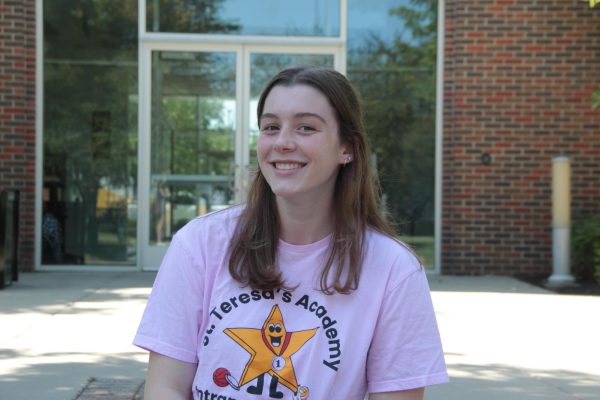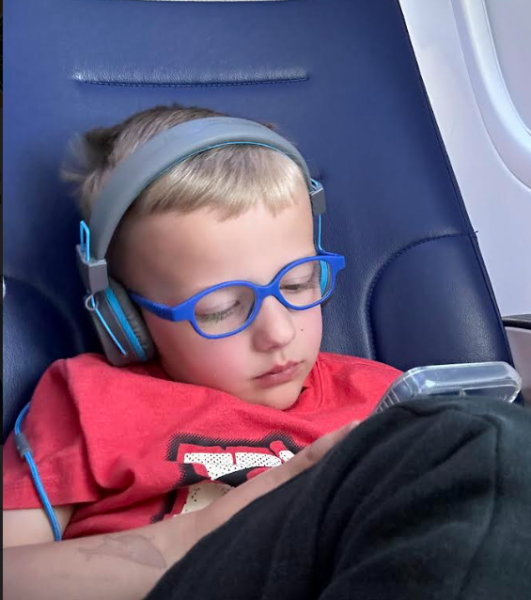Studying Abroad
Three STA students share their opinions about taking college level foreign language classes. They discuss the highs and lows of their experience and whether or not they would recommend taking the class.
Aliya Watne exits the M&A Building after checking out with receptionist Allison Wilson Nov. 4. Students in her french class leave campus after period 1 and return after lunch. photo by Sophia Rall
April 11, 2022
STA offers numerous higher education options — such as honors and AP classes — to help its students succeed in the classroom. Among these opportunities is the chance to venture off campus to enroll in college-level language classes that can help them earn college credits for their future.
According to Education Week, only 25% of high school students were taking foreign language classes as of 2017.The percentage decreases amid students taking a language class at a college level. STA students, however, have many choices of language classes to take at school, and have the opportunity to take college level language courses at Rockhurst University.
STA students who attended Académie Lafayette for grade school have been taking French classes since they were in kindergarten. Junior Sylvie Boughner, an Académie Lafayette graduate, thought that taking a college language class would be the perfect opportunity for her.
“I thought it would help me with my college transcripts and then I would just be able to continue my French learning and just keep advancing,” Boughner said.
Senior Claire Fanning ended up in her college Spanish class by accident. Although Fanning has been taking Spanish classes daily since seventh grade, she didn’t realize that the class she signed up for was an actual college course.
“I honestly didn’t know that it was going to be off campus when I signed up, but I figured it would be fun to go off campus for the class, and I just was continuing on the track I had been on for Spanish,” Fanning said.
While Fanning was excited to take the class because of the change in schedule consequential to leaving campus, she also found that it could complicate her day-to-day life at STA.
“It makes things very different because it’s like a block class on Mondays and Wednesdays for an hour and fifteen minutes, so Mondays and Wednesdays are definitely a little more tiring for me,” Fanning said.
Boughner agrees that the off-campus aspect of the class has really affected her schedule. She feels as though the class causes her to miss out on some of STA’s fun activities during the day.
“It’s created a lot of inconveniences because I know a lot of times we have pep rallies when we’re at Rockhurst, or there was a club fair and we had to miss it,” Boughner said.
Senior Lorraine Frueh, however, was surprised by how unaffected her schedule was by her college course.
“Honestly, the only difficult thing about it is that I have to use another site to check my grades, because we use Powerschool but they use Canvas,” Frueh said.
However, there are still some occasional changes in Frueh’s day-to-day life at STA because of her college class.
“I had one time that I had to leave during the day because I had to go watch a movie with my French class, but they didn’t account for the fact that we were in high school,” Frueh said.
As a high school student taking a class at a college, Fanning sometimes feels uncomfortable around the university students.
“It feels like everyone’s staring at you if you don’t change out of your uniform,” Fanning said.
For Frueh, however, the people are the best part of the class. After a year of taking the course online, she was excited to meet her college classmates and found that she really likes them.
“A lot of the people who I was online with last year took [the class] again, so it was nice to finally meet them in person,” Frueh said.
Although she enjoys the company of her peers in the classroom, there is a downside for Frueh—the lack of challenge in the work. Like Boughner, Frueh is a graduate of Académie Lafayette, meaning she is near fluent in French. The college students in her class; however, are not.
“I find the coursework to be a little bit understimulating,” Frueh said.” It’s a lot of worksheets and I was like ‘I thought this was a college class.’”
Fanning, however, finds the workload of her class to be extremely heavy. As a non-fluent Spanish speaker in a class full of mostly-fluent peers and a fluent teacher, she finds herself struggling to keep up.
“It feels like I’m racking my brain trying to put the words together in the right format,” Fanning said. “It’s probably going to end up being one of the worst grades I’ve ever gotten, but it’s also a harder class.”
While Fanning experiences high amounts of stress from this class, Boughner doesn’t feel the same way. She finds the change in her schedule to be the most difficult aspect.
“I think just the days, just because I don’t have a free period, are a little stressful, but the class itself doesn’t bring any stress,” Boughner said.
Although Frueh and Fanning are both dropping the class next semester, they both feel that there are very positive things about their respective college classes.
Frueh finds that taking college courses will benefit her in the long run, and she would recommend it to younger students who will have the opportunity.
“I want to minor in French, and this is the easiest way to get the credits. You only need about twelve credits to minor in a language and I’m getting nine right now, so it gives me a big head start,” Frueh said.
While Fanning has found her college Spanish class to be extremely difficult, she feels that the overall experience has benefited her.
“It’s definitely the hardest class I’ve ever taken, but it definitely gave me a better understanding of how people who speak languages other than English have trouble, because I’m in this class and everyone seems fluent and I’m just like, ‘Oh my gosh how do I say this?’”









